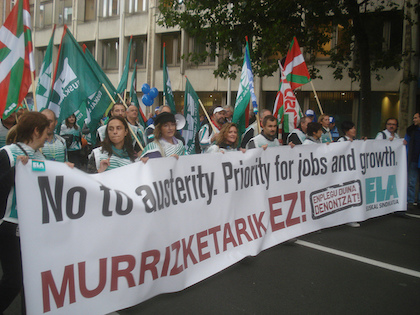|
Since the signing of the Single European Act in 1986, the European Union has been unable to agree on legislation which would provide working people with minimum social guarantees and common rights as workers in the face of the onslaught of the unified market forces. The result has been the continued erosion in the social well being of European workers.
| |||

Anti-austerity protest in Brussels, Belgium, home to the Parliament of the European Union, Surat Lozowick,
| |||
After the Italian sea search-and-rescue operation Mare Nostrum at a cost of nine million euros a month, through which the Italian Navy has rescued nearly 100,000 migrants – although perhaps up to 3,000 have died – from the Mediterranean since October 2013, Europe is now presenting its new face in the Mediterranean.
The European Union is launching Joint Operation Triton with a monthly budget of 2.9 million euros and funds secured until the end of the year. Its function is to enforce border controls – not to save “boat people” – and it will patrol just thirty nautical miles from the coast, which pales in comparison with Italy’s Mare Nostrum operation which saw patrols being sent close to the Libyan coast.
| |||

“Every inhabitant of this planet must contemplate the day when this planet may no longer be habitable.” Thus spoke President Kennedy in a 1961 address to the United Nations. The threat he warned of was not climate chaos — barely a blip on anybody’s radar at the time — but the hydrogen bomb. The nuclear threat had a volatile urgency and visual clarity that the sprawling, hydra-headed menace of today’s climate calamity cannot match. How can we rouse citizens and governments to act for concerted change? Will it take, as Naomi Klein insists, nothing less than a Marshall Plan for Earth?
“This Changes Everything: Capitalism vs. the Climate” is a book of such ambition and consequence that it is almost unreviewable. Klein’s fans will recognize her method from her prior books, “No Logo: Taking Aim at the Brand Bullies” (1999) and “The Shock Doctrine: The Rise of Disaster Capitalism” (2007), which, with her latest, form an antiglobalization trilogy. Her strategy is to take a scourge — brand-driven hyperconsumption, corporate exploitation of disaster-struck communities, or “the fiction of perpetual growth on a finite planet” — trace its origins, then chart a course of liberation. In each book she arrives at some semihopeful place, where activists are reaffirming embattled civic values.
To call “This Changes Everything” environmental is to limit Klein’s considerable agenda. “There is still time to avoid catastrophic warming,” she contends, “but not within the rules of capitalism as they are currently constructed. Which is surely the best argument there has ever been for changing those rules.” On the green left, many share Klein’s sentiments. George Monbiot, a columnist for The Guardian, recently lamented that even though “the claims of market fundamentalism have been disproven as dramatically as those of state communism, somehow this zombie ideology staggers on.” Klein, Monbiot and Bill McKibben all insist that we cannot avert the ecological disaster that confronts us without loosening the grip of that superannuated zombie ideology.
